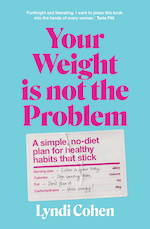Using healthy food language around children is crucial for them developing a healthy relationship with food.
Sometimes, when talking to our children, we can say things absentmindedly that we don’t quite realise could be triggering or unhealthy for their relationship with food or their body.
Phrases you might say to your kids without realising
- Did you really just eat all that food?
- How can you still be hungry?
- Do you really need to have dessert?
- Wow, you’re really eating a lot today!
Read on to find out why these phrases are harmful and what we can say instead.
Why you should update your food language
Research from the Journal of Nutrition Education and Behavior shows that mothers of heavier children use different words to restrict eating than parents of children with smaller bodies. Parents of children with obesity were more than 90 per cent more likely to use direct statements such as, “You’re only allowed one more” to prevent children from eating high-energy “sometimes” food as opposed to other mothers who used less direct statements like, “You have had dinner”.
Small changes can quickly help you update the language you use around food. It’s nuanced! And tricky. One thing you can do is stop referring to food as “good” or “bad”. That’s because the words good and bad are intrinsically loaded with moral value, and applying those judgements can be unhelpful. And if you can, try not to use food as treats or even call them “treat food”, as this can create an emotional relationship between their mood and what they are allowed to eat.
Kids who have regular access to all foods can choose to eat as much as they feel like and stop when they’ve had enough—that’s intuitive eating. It’s unhelpful to categorise foods as “good” and “bad”. While there may be foods that are healthier than chocolate, this does not make chocolate a “bad” food that deserves feelings of shame or judgement when enjoyed.
As for bribery, as a mother of a toddler I’m not above it, but food-as-reward can be a slippery slope to emotional and binge eating. I’m not keen on planting the idea that some foods have to be earned, as I know first hand how this can lead to the opposite idea—that eating those foods must be followed by “working them off” or, essentially, “earning” them after the fact. Instead, I prefer to offer non-food based rewards like some time at the park or an extra book at bedtime.
Talk about how food makes you feel. Not weight
When we’re worried about our child’s weight, it’s tempting to encourage them to eat less. But even well-intentioned comments can have long-term negative consequences for our kids. A woman’s dissatisfaction with her adult weight is related to the extent her parents made comments about her weight. It’s something I know from my own experience. Research shows that 66 per cent of teenagers whose parents comment on their weight will go on to be overweight or obese.
Read: When your child says “I’m fat”
One study showed grown women whose parents had commented on their weight were far more likely to have a higher BMI and dislike their body. In fact, the more comments they received, the more weight they gained. Research also suggests weight-based comments make you far more likely to develop an eating disorder. Other studies show that weight comments encourage binge eating, emotional eating and eating in secret or hiding food.
When talking about food, never talk about eating certain food because it will make you fat or help you lose weight. Instead, talk about how food makes you feel and what it does for you. Explain that some foods give us great energy so we can do the things we love like play with friends and do sports. You can explain that some foods make us feel better than others. Teach them to eat all the colours of the rainbow to get all the nutrients to grow strong and healthy.
How do you get your child to eat a wider variety of food? Nutritionist Amanda Muhl explains.
Zoning in on what our bodies can do rather than what they look like is a really nice lesson for kids. Whether it’s how strong their arms are, how fast their legs can run, how deep their lungs can breathe, how clever their brain is, all these things can help build a positive body image that has nothing to do with thinness or size.
What to say instead
When you’re tempted to say any of the phrases at the start of this article or ones like them, use these moments instead as opportunities to help your kids be better guided by your appetite.
You could say:
- How does your tummy feel? Are you still hungry?
- If you’re still hungry, then that’s your body’s way of telling you to have more.
- Do you think you’re hungry or is it just really yummy?
If your child is older and saying these things would feel too strange, see if you can notice your child’s appetite but don’t feel the need to comment on it. Be a role model by eating when you’re hungry. It’s important not to make them worry that there is something wrong with their appetite simply because you think they’re eating more than you think they should. Remember, you’ve got years of dieting under your belt, so trust that their appetite is a reliable guide for them. Even if they do overeat, allowing kids to do so is part of them understanding their appetites.
Allowing kids to experience that sick-from-eating-too-much feeling builds your child’s internal feedback loop so they can learn for themselves that “when I eat too much chocolate, I don’t feel good”. This is critical. We want our kids to be able to listen to what their tummy says, because as adults, we’ve often lost track of our internal hunger management system—our appetite.
Given some independence around food, children will likely self-regulate. As parents, if we can get out of their way, help them listen and respond to their body’s innate cues, they will develop an internal motivation to eat well. When they become adults, this can transform their thinking from, “I shouldn’t eat too much chocolate because it’s bad for me” to a much healthier perspective of, “I don’t want to eat too much chocolate because it doesn’t feel good”.
So the good news is you can save your energy, worrying each time they reach for another snack. Yes, it might be tempting to jump in with phrases like, “Eat your greens, then you can have some chocolate” or “You’ve had enough”, but try not to interfere.
We want our kids to learn that chocolate is just food, and they can eat it without becoming obsessed with it. After all, research suggests parents who place too much control over discretionary foods like chocolate can contribute to children having a long-term obsession with these foods.

Text from Your Weight is Not the Problem by Lyndi Cohen. Murdoch Books RRP $32.99.
How helpful was this article?
Click on a star to rate it!
0 / 5. 0
Be the first to rate this post!
Lyndi Cohen
Related posts
Subscribe
Receive personalised articles from experts and wellness inspiration weekly!


